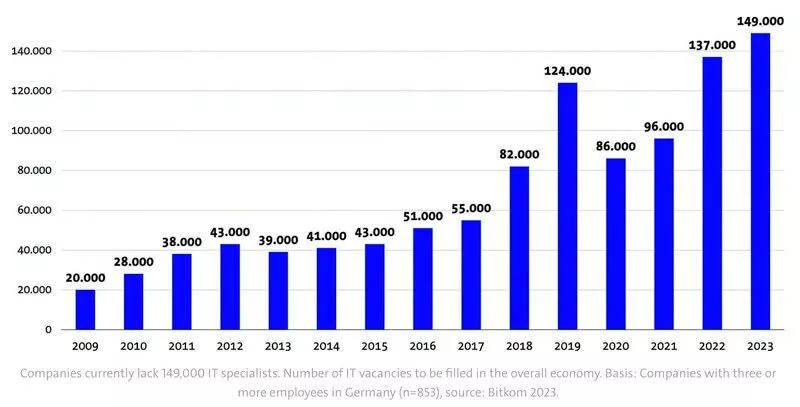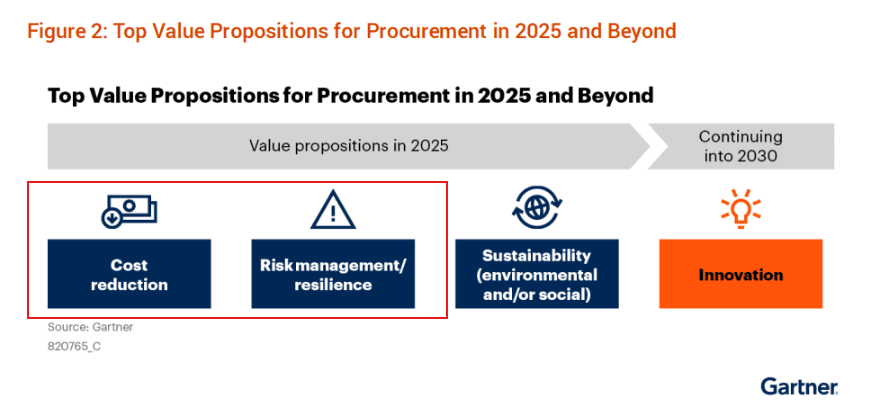Germany’s IT talent shortage has made outsourcing essential. While Europe remains a key region, Southeast Asia offers skilled talent and cost benefits. Explore how German firms are leveraging offshoring to bridge their talent gaps and enhance operational efficiency.
Embracing Global Sourcing: Potential to Fill 149,000 IT positions in Germany
Bitkom (Germany’s digital association) projects a shortage of 663,000 IT specialists in Germany by 2040, with 149,000 positions already unfilled last year.
Adding to this challenge is a decline in interest in IT studies since 2019, resulting in fewer graduates entering the workforce (CACM, 2023).
At Germany’s recent digital summit, Bitkom President Dr. Ralf Wintergerst highlighted the country’s urgent need to bridge the talent gap in the tech sector. He described the shortage of IT professionals as a “systemic problem for the German economy. “

Companies in Germany (n=835) currently lack 149,000 IT specialists, source: Bitkom 2023.
The local skill shortage – compounded with the high costs of local recruiting and the growing demand for IT specialists – has led German companies to outsource IT services to countries with cost advanatage and a large pool of skilled professionals.
When choosing outsourcing destinations, 77% business executives in Germany outsource software development in Eastern Europe. Convenient time zones, cultural alignment, and shared language backgrounds make Europe the most attractive outsourcing region for Germany.
However, Asia is emerging as an alternative, with 18% of German firms hiring developers from this region.
Key Advantages for German Companies Outsourcing to Eastern Europe and Asia
By entrusting certain operations to external specialists, German organizations can not only reduce costs but also sharpen their focus on core competencies. Here are some of the primary benefits outsourcings can bring to companies:
- Cost Efficiency: Outsourcing in Eastern Europe ($34-$74/hour) and Asia ($15-$25/hour) can reduce operational costs by 50% compared to domestic recruitment, providing a strategic advantage for companies looking to optimize their budgets.
- Talent Access: These regions boast a vast pool of well-qualified IT professionals, offering high-quality service and mitigating the talent shortages currently faced in Germany’s tech industry.
- IStreamlined Operations: Partnering with experienced outsourcing firms allows companies to leverage specialized expertise, enhancing overall process efficiency. For example, an European fintech solution provider enhanced its decision-making processes by 20% and optimized resource allocation by up to 30% through building a comprehensive delivery center in Vietnam.
- Core Focus: By outsourcing non-core functions, organizations can concentrate on their primary objectives and growth strategies, adhering to the principle: Do what you do best – outsource the rest.
Southeast Asia: A Promising Destination Among German Enterprises
The ongoing conflict in Ukraine has disrupted the IT outsourcing market in Eastern Europe, prompting many German companies to explore alternative destinations in the Asia-Pacific. Southeast Asian countries, including Malaysia, Thailand, the Philippines, and Vietnam, are increasingly appealing due to their skilled talent pools, competitive outsourcing offerings and less formidable domestic competition.
Amid shifting global trends like the COVID-19 pandemic and rising geopolitical tensions, ‘Cost reduction’ and ‘Risk management’ have emerged as top priorities for procurement leaders across Western Europe in 2025, according to Gartner. In this context, Southeast Asia offers a strategic advantage for German businesses looking to diversify and stabilize their operations.

German companies are increasingly attracted to Southeast Asia due to initiatives like Porsche AG’s exploration of assembly operations in Malaysia and Thailand’s potential to become Germany’s electric vehicle manufacturing hub in Asia.
Also, Vietnam has become a focal point for German business interests, highlighting its growing importance as a strategic and reliable outsourcing partner in Southeast Asia. The country’s advancements in software development are well-recognized; according to the “Future of IT” report by Emerging Europe, Vietnam now ranks 12th globally, surpassing established outsourcing destinations like Ukraine, Argentina, and the entire African region.
German companies are increasingly interested in Vietnam, with Bosch, a long-standing presence in the country, planning to expand its Vietnamese software workforce by 2,000 next year. Currently employing 6,200 people in Vietnam, including 4,000 in software production, Bosch aims to grow this to 6,000 by 2025 — solidifying Vietnam as a vital part of its global strategy and a prime outsourcing destination for German businesses.
Read more: 8 Huge Benefits of Offshore Development in Vietnam (2024 Updated)
Bridging Germany’s Tech Talent Gap with CMC Global
Facing a critical IT talent shortage, German companies are increasingly turning to IT outsourcing to stay competitive. Europe remains the preferred outsourcing destination due to cultural and language alignment, but Southeast Asia—especially Vietnam, Malaysia, Thailand, and the Philippines—has emerged as a cost-effective, high-quality alternative.
If you’re searching for a reliable destination for your software project, Vietnam and its top IT outsourcing companies should be on your radar.
For immediate assistance navigating Vietnam’s IT outsourcing market, simply fill out the form below, and a CMC Global consultant will reach out to you promptly!




